Podcast: Play in new window | Download (Duration: 12:03 — 8.4MB) | Embed
Subscribe: Apple Podcasts | Spotify | Amazon Music | Android | Pandora | iHeartRadio | JioSaavn | Podchaser | Gaana | Podcast Index | Email | TuneIn | Deezer | Anghami | RSS | More
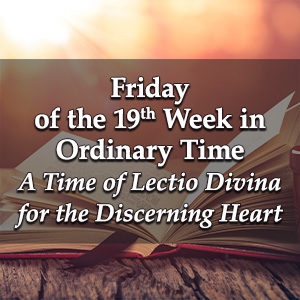 Friday of the Nineteenth Week in Ordinary Time – A Time of Lectio Divina for the Discerning Heart Podcast
Friday of the Nineteenth Week in Ordinary Time – A Time of Lectio Divina for the Discerning Heart Podcast
As you begin, take a deep breath and exhale slowly. For at least the next few moments, surrender all the cares and concerns of this day to the Lord.
Say slowly from your heart “Jesus, I Trust In You…You Take Over”
Become aware that He is with you, looking upon you with love, wanting to be heard deep within in your heart…
From the Holy Gospel According to St. Matthew 19:3-12
Some Pharisees approached Jesus, and to test him they said, ‘Is it against the Law for a man to divorce his wife on any pretext whatever?’ He answered, ‘Have you not read that the creator from the beginning made them male and female and that he said: This is why a man must leave father and mother, and cling to his wife, and the two become one body? They are no longer two, therefore, but one body. So then, what God has united, man must not divide.’
They said to him, ‘Then why did Moses command that a writ of dismissal should be given in cases of divorce?’ ‘It was because you were so unteachable’ he said ‘that Moses allowed you to divorce your wives, but it was not like this from the beginning. Now I say this to you: the man who divorces his wife – I am not speaking of fornication – and marries another, is guilty of adultery.’
The disciples said to him, ‘If that is how things are between husband and wife, it is not advisable to marry.’ But he replied, ‘It is not everyone who can accept what I have said, but only those to whom it is granted. There are eunuchs born that way from their mother’s womb, there are eunuchs made so by men and there are eunuchs who have made themselves that way for the sake of the kingdom of heaven. Let anyone accept this who can.’
What word made this passage come alive for you?
What did you sense the Lord saying to you?
Once more give the Lord an opportunity to speak to you:
Some Pharisees approached Jesus, and to test him they said, ‘Is it against the Law for a man to divorce his wife on any pretext whatever?’ He answered, ‘Have you not read that the creator from the beginning made them male and female and that he said: This is why a man must leave father and mother, and cling to his wife, and the two become one body? They are no longer two, therefore, but one body. So then, what God has united, man must not divide.’
They said to him, ‘Then why did Moses command that a writ of dismissal should be given in cases of divorce?’ ‘It was because you were so unteachable’ he said ‘that Moses allowed you to divorce your wives, but it was not like this from the beginning. Now I say this to you: the man who divorces his wife – I am not speaking of fornication – and marries another, is guilty of adultery.’
The disciples said to him, ‘If that is how things are between husband and wife, it is not advisable to marry.’ But he replied, ‘It is not everyone who can accept what I have said, but only those to whom it is granted. There are eunuchs born that way from their mother’s womb, there are eunuchs made so by men and there are eunuchs who have made themselves that way for the sake of the kingdom of heaven. Let anyone accept this who can.’
What did your heart feel as you listened?
What did you sense the Lord saying to you?
Once more, through Him, with Him and in Him listen to the Word:
Some Pharisees approached Jesus, and to test him they said, ‘Is it against the Law for a man to divorce his wife on any pretext whatever?’ He answered, ‘Have you not read that the creator from the beginning made them male and female and that he said: This is why a man must leave father and mother, and cling to his wife, and the two become one body? They are no longer two, therefore, but one body. So then, what God has united, man must not divide.’
They said to him, ‘Then why did Moses command that a writ of dismissal should be given in cases of divorce?’ ‘It was because you were so unteachable’ he said ‘that Moses allowed you to divorce your wives, but it was not like this from the beginning. Now I say this to you: the man who divorces his wife – I am not speaking of fornication – and marries another, is guilty of adultery.’
The disciples said to him, ‘If that is how things are between husband and wife, it is not advisable to marry.’ But he replied, ‘It is not everyone who can accept what I have said, but only those to whom it is granted. There are eunuchs born that way from their mother’s womb, there are eunuchs made so by men and there are eunuchs who have made themselves that way for the sake of the kingdom of heaven. Let anyone accept this who can.’
What touched your heart in this time of prayer?
What did your heart feel as you prayed?
What do you hope to carry with you from this time with the Lord?
Our Father, who art in heaven,
hallowed be thy name.
Thy kingdom come.
Thy will be done on earth, as it is in heaven.
Give us this day our daily bread,
and forgive us our trespasses,
as we forgive those who trespass against us,
and lead us not into temptation,
but deliver us from evil.
Amen


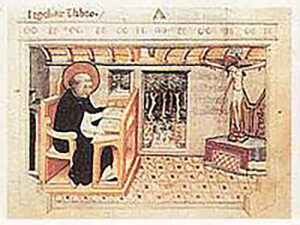
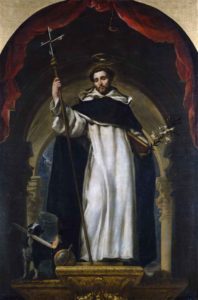 For the complete list visit:
For the complete list visit: St. Bernard you have said:
St. Bernard you have said: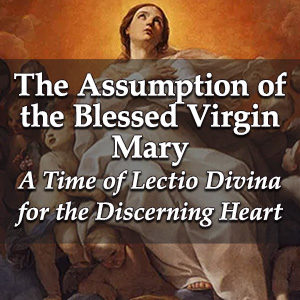 Assumption of the Blessed Virgin Mary – A Time of Lectio Divina for the Discerning Heart Podcast
Assumption of the Blessed Virgin Mary – A Time of Lectio Divina for the Discerning Heart Podcast
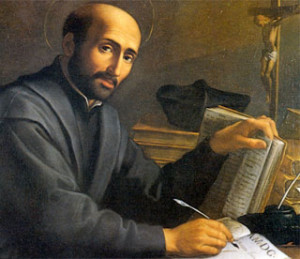


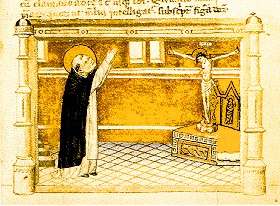

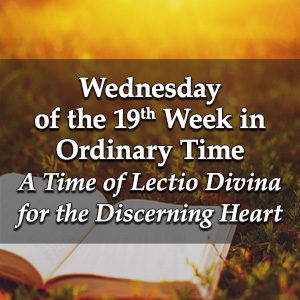 Wednesday of the Nineteenth Week in Ordinary Time – A Time of Lectio Divina for the Discerning Heart Podcast
Wednesday of the Nineteenth Week in Ordinary Time – A Time of Lectio Divina for the Discerning Heart Podcast